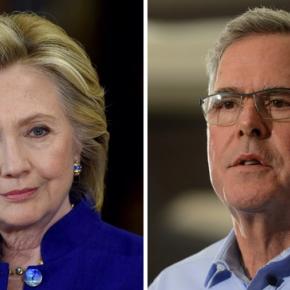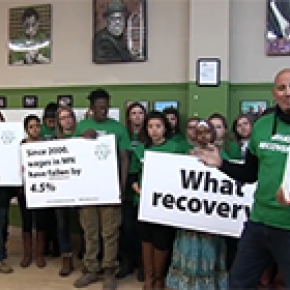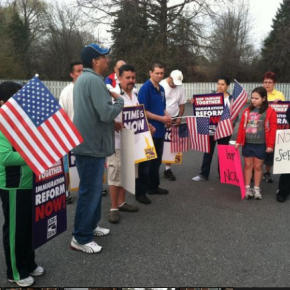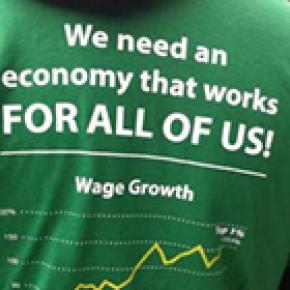Jeb and Hillary’s opportunity on workweek fairness
Jeb Bush and Hillary Clinton have been trading barbs about whether Americans are working hard enough, but behind the...
Jeb Bush and Hillary Clinton have been trading barbs about whether Americans are working hard enough, but behind the give-and-take is a real emerging issue that has a dire impact on our country’s 75 million hourly workers and their families: the 40 hour workweek is no longer something we can count on. The candidates have a chance to move beyond the gamesmanship and support concrete solutions at the national and local level to show their commitment to the stability of working families.
To summarize the exchange, Bush said that “people need to work longer hours.” Clinton quickly responded on Twitter, “Anyone who believes Americans aren't working hard enough hasn't met enough American workers.” Bush retorted, referencing the number of people who are involuntarily working part time and seeking full time work that, “Anyone who discounts 6.5 million people stuck in part-time work and seeking full-time jobs hasn’t listened to working Americans.”
Taken at their word, neither of them is wrong; both sides of the argument resonate in the lived experiences of the millions of people working by the hour. For hourly workers trying to work enough hours to earn enough to get by, it can mean taking the hours they can get –sometimes working short four-hour shifts, putting their lives on hold for a last-minute on-call shift, or working the late night shifts followed by too little sleep because of an early morning shift the next day – also known as a “clopen.”
This is reality for millions of Americans all across the country. Strained, exhausted, and without seeing their families some days. Their rent and bills are predictable, but the work hours they need to pay them are not.
Many of these workers both want more hours, like Bush says, and are working hard, like Clinton says. The American workforce is rapidly changing, and millions of people are caught in a cycle of too few hours, too little control of when their hours occur, and not getting paid for the time they make available to their employers. For part-timed hourly workers, there’s often no way to get ahead.
The issue missing from Jeb and Hillary’s exchange is how underemployment and unpredictability go hand in hand. The one thing these workers can count on is that their schedules will change each week, sometimes with just minutes’ notice. This last minute notice is typical of part-time hourly workers across the economy, especially in fast food and retail, by employers like Target, Starbucks, the Gap, Victoria’s Secret, and others. It’s impossible to pick up more hours at another job if you don’t know day to day what your schedule will be.
If Jeb Bush and Hillary Clinton are looking for real solutions to these issues, a new movement being led by working moms has some concrete policy solutions to offer. Last week, Congress introduced the Schedules That Work Act, a path-breaking bill addressing these underlying problems of part-time work that Bush and Clinton are debating. The bill is a result of workers calling for schedules they can predict, more stable hours they can count on, and the right to have a say into the hours they work without retaliation. The Schedules That Work Act has garnered a wave of support, in both the House and Senate, and comes after a year when legislators in 12 states introduced policies to guarantee a fair workweek, including active municipal campaigns that includes Minneapolis, Albuquerque, and Washington DC.
Clinton launched her campaign and declared, “I believe you should receive your work schedule with enough notice to arrange childcare or take college courses to get ahead” and Bush’s recent statements on involuntary part-time work show that even the GOP can’t ignore the under-employed. But the chaos that under-employment and unpredictable scheduling sows into workers lives is not just fuel for rhetoric, it’s real. And it requires real policy solutions. Hillary and Jeb have the chance to go deeper than their back and forth, address the common underlying problems they’ve both identified, and stand in favor of federal and local legislation that builds a fair workweek.
Gleason is the director of the Fair Workweek Initiative at the Center for Popular Democracy
Source: The Hill
Fed Up Coalition Complains About Jackson Hole Room Cancellations

Fed Up Coalition Complains About Jackson Hole Room Cancellations
A group of activists planning to attend the Federal Reserve Bank of Kansas City’s annual economic symposium in Jackson...
A group of activists planning to attend the Federal Reserve Bank of Kansas City’s annual economic symposium in Jackson Hole, Wyo., has filed a complaint with the National Park Service, the Department of the Interior’s Inspector General’s Office and the Justice Department after the conference hotel canceled the group’s room reservations.
The Center for Popular Democracy’s Fed Up Coalition said in an Aug. 9 letter that it booked 13 rooms in May at the Jackson Lake Lodge for its members for the nights of Aug. 24, 25 and 26. Last month, the lodge informed the group that their reservations had been canceled because of a “computer glitch,” according to the letter.
But the lodge didn’t cancel the reservations for other guests who booked after Fed Up did, said the letter written by Ady Barkan, campaign director of Fed Up, a left-leaning group that has lobbied for more diversity among Fed officials and more openness about the selection of regional Fed bank presidents.
“It is very hard for me to interpret the Company’s actions as anything other than a specific targeting of the Fed Up coalition,” he wrote in the letter.
Mr. Barkan said the group booked rooms at other hotels farther away from the conference, which will make it difficult for activists to attend events.
The Jackson Hole conference draws central-bank officials and economists from around the world who gather near the Grand Tetons to discuss monetary policy.
Fed Up members have been attending the conference for the past two years to urge Fed officials to hold off on raising interest rates, arguing that higher borrowing costs will slow economic growth and hurt low-income households. The group’s members often hold events and rallies near Fed events, wearing their signature green T-shirts.
A spokesperson for the Jackson Lake Lodge didn’t return a call for comment. Kathy Kupper, a spokeswoman for the National Parks Service said the lodges are run by independent contractors who are responsible for their day-to-day operations.
Mr. Barkan said he was writing the letter “to file a formal complaint regarding improper and potentially illegal behavior,” by the company.
By David Harrison
Source
Watch Live: Young Immigrants Rally In DC To Call On Congress To Save DREAMers

Watch Live: Young Immigrants Rally In DC To Call On Congress To Save DREAMers
(Interview with Ana Maria Archila at 1:09:10)...
(Interview with Ana Maria Archila at 1:09:10)
Watch the full video here.
Fed Should “Freeze Interest Rates, Involve Citizens” Says Neighborhoods Organizing For Change
The Uptake - March 10, 2015, by Bill Sorem - Not everybody is benefiting equally from the economic recovery. A new...
The Uptake - March 10, 2015, by Bill Sorem - Not everybody is benefiting equally from the economic recovery. A new report shows in Minnesota blacks are suffering disproportionally to whites when it comes to employment.
Anthony Newby, Executive Director of Neighborhoods Organizing for Change (NOC), delivered a report of about the current economic state of people of color in Minnesota and specifically the current and possible role of the Federal Reserve Bank. The new report from the Center for Popular Democracy says since 2000, wages in Minnesota have declined by 4.5%, current unemployment rate for blacks is 10.9% vs a white rate of 2.8%.
This is the link to the full report “Wall Street, Main Street, and Martin Luther King Jr. Boulevard: Why African Americans Must Not Be Left Out of the Federal Reserve’s Full-Employment Mandate”
Newby argues that the Fed in addition to controlling interest rates, can control the rate of unemployment. He and Rev. Paul Slack, ISIAH President, ask that interest rates be kept at the current levels and that the Fed work to reduce unemployment.
Why there is a Federal Reserve
The nation’s central bank, the Federal Reserve, was created on December 23, 1913, with the enactment of the Federal Reserve Act, largely in response to a series of financial panics. There had been strong resistance to a central bank since the founding of the nation. The Fed was given the power to print money, establish bank interest rates and a number of sweeping powers. It is an independent entity within government, ownership of each of the 12 banks is claimed be the member banks, but the actual fiscal ownership is obscure. The ability to print money and loan it to the government is at the heart of its power and for many, a controversial power. President Kennedy challenged the authority of the Fed with Executive Order 11110, June 4, 1963 and he attempted to eliminate our current paper money, the Federal Reserve Note replacing it with US Notes. He did not succeed.
Newby further requested more transparency in the actions of the Fed and asked for more ordinary citizen participation. The current president of the Federal Reserve Bank of Minneapolis, Narayana Kocherlakota, has indicated a willingness to keep interest rates low and to move towards more citizen participation in the actions of the Fed. However, he retires in a year. Newby would like citizens to have input on his successor.
Rev. Slack asked for justice and compassion in the Fed policies, in part to undo past unfair actions.
Source
Aldermen, Activists Propose City Ordinance To Raise Minimum Wage
Chicagoist - May 28, 2014, by Aaron Cynic - Supporters of raising the minimum wage introduced an ordinance at a City...
Chicagoist - May 28, 2014, by Aaron Cynic - Supporters of raising the minimum wage introduced an ordinance at a City Council meeting today that calls for an increase to $15 an hour. The proposal, backed by several Aldermen including John Arena, Joe Moreno and Roderick Sawyer, comes on the heels of a report released that shows a raise in the wage would benefit both workers and the City’s economy.
According to the plan, companies making more than $50 million a year would be required to first raise their minimum wage to $12.50 an hour within 90 days and then to $15 within a year. Smaller businesses would have to raise their wages at a more graduated rate, with a total of four years to get to $15. From there, the minimum wage in Chicago would rise with the rate of inflation.
“Study after study demonstrates that when you put money into the pockets of consumers, they spend it," Alderman Ricardo Munoz, who also backs the measure, told Reuters. "They don't hoard it in their mattresses.”
The recent report from the Center for Popular Democracy says a minimum wage increase would yield workers about $1.1 billion collectively, with an average annual income increase of $2,620 per individual. This would generate $74 million in personal income taxes to the state and yield $616 million in new economic activity.
At a press conference at City Hall, Tanika Smith, a fast food worker, said her current pay of $8.75 an hour, just 50 cents more than the minimum wage in Illinois, simply isn’t enough. “My car note is $500 a month, my rent is about $500, food is going up, lights are going up,” said Smith.
Raising the minimum wage is becoming a key issue with politicians statewide. Last week, Mayor Rahm Emanuel gave a panel of business, labor and civic leaders 45 days to draft a plan to raise the wage in Chicago. Gov. Pat Quinn has championed raising the state wage to $10.65 an hour, and Illinois House Speaker Michael Madigan is pushing for a referendum on the November ballot to ask voters if the wage should be raised to $10 an hour.
Both the Illinois Chamber of Commerce and Illinois Retail Merchant’s Association oppose an increase to the minimum wage. “We think it puts us at a competitive disadvantage,” Chamber CEO Theresa Mintle told Reuters. The Retailers Association has said that raising the wage would force businesses to cut both jobs and hours.
Ald. Moreno, however, disagrees.
“It’s gonna hurt the people at the top possibly. It’s not gonna hurt business. It never has. Raising the minimum wage in the United States has never, ever hurt the broader economy...Our economy has been splintered with those at the top having way more. The middle class is shrinking. We want the middle class to grow.”
Source
"You can save my life - remember this conversation": Father with ALS confronts Senator Jeff Flake on flight from DC to Arizona over tax bill*

"You can save my life - remember this conversation": Father with ALS confronts Senator Jeff Flake on flight from DC to Arizona over tax bill*
A terminally-ill father suffering Lou Gehrig's disease shared his personal story with Sen. Jeff Flake with the ambition...
A terminally-ill father suffering Lou Gehrig's disease shared his personal story with Sen. Jeff Flake with the ambition to make an influence on his stance of the GOP tax reform bill.
Ady Barkan, 33, approached the Republican lawmaker during his flight home from Washington D.C. - where the ill Barkan had spent days protesting the bill.
Read the full article here.
Over 100 Progressive Local Elected Officials Gather in Los Angeles

Over 100 Progressive Local Elected Officials Gather in Los Angeles
(LOS ANGELES – Oct. 26) More than 100 progressive elected officials from across the United States are gathering in Los...
(LOS ANGELES – Oct. 26) More than 100 progressive elected officials from across the United States are gathering in Los Angeles today through Wednesday for a three-day convention to discuss key planks of the progressive agenda like workers’ rights, racial justice, and public education.
Council members, school board members, and mayors flew in from around the country for the Fourth Annual Convening of Local Progress, the network of progressive elected officials. Los Angeles First Lady Amy Elaine Wakeland opened the convening, which Los Angeles Mayor Eric Garcetti is co-hosting with Local Progress, with a welcome address.
New York City Mayor Bill de Blasio, a member of the network, sent a video message to the attendees encouraging them to continue their good work fighting for progressive policy that improves the lives of their cities’ residents.
Elected officials will join the nation’s leading policy experts, organizers, and advocates to learn about and share best practices on a range of policy areas including police reform, the fight for $15, and equitable development and affordable housing. The full agenda is here.
Sarah Johnson, Co-Director of Local Progress, released the following statement: “Today, cities are the great hope for the progressive movement. In order to achieve transformative victories at the local level, we need elected officials who are integrated into our movement, strategizing and working with the organizations who are fighting for a pro-worker, pro-immigrant, racial justice agenda. Local Progress is building spaces for creating those collaborations and relationships, and for driving trans-local victories. By collaborating across cities – like we’ve done on paid sick days and the minimum wage – we can transform the national dialogue and build towards a country in which everybody is able to live a dignified life.”
San Francisco Supervisor John Avalos, Chair of the Board of Directors of Local Progress, released the following statement: “Across the country, the elected official members of Local Progress are passing crucial legislation to create a more just and equitable society. From $15 minimum wages to fighting climate change to laws reforming police practices, from programs to create affordable housing to policies that protect immigrant families from the destructive force of deportation, cities are leading the way forward. Our convening this week was a special opportunity to bring together these leaders from around the country to share best practices, build solidarity with one another, and plan for the important fights ahead in 2016.”
Mary Kay Henry, President of the Service Employees International Union, released the following statement: “SEIU’s members recognize the need to build a broad progressive movement for social justice. We are fighting to build a country where every family is able to give their children a dignified life. SEIU members across the country are proud to partner with their local elected officials to advance crucial public policies that promote economic and racial justice. We helped found Local Progress because we know that our movement needs sustainable, long-term infrastructure so that cities can innovate important policies that lift up working families and, like the Fight for $15 campaign led by courageous fast food workers, change the national political dialogue. We are excited by the growth of the network and eager to build, hand-in-hand with community-based organizations and elected officials, for our movement’s collective long-term success.”
Tefere Gebre, Executive Vice President of the AFL-CIO, released the following statement: “If we are going to raise wages in America, we need cities to lead the way. Local elected officials must stand side-by-side with the workers who are fighting for dignity on the job. The AFL-CIO and our affiliates are proud to partner with local elected officials from around the country who are advancing a pro-worker, pro-immigrant, racial justice agenda. Together, we know that we can build a society where everybody who wants to can find a living wage job, and where families can raise their children in economic security and dignity.“
For interview opportunities with Sarah Johnson, John Avalos, Mary Kay Henry, or Tefere Gebre, or any of the elected officials attending the Local Progress convening, please contact Anita Jain at ajain@populardemocracy.org, 347-636-9761 or Sofie Tholl at stholl@populardemocracy.org, 646-509-5558.
###
www.populardemocracy.org
The Center for Popular Democracy promotes equity, opportunity, and a dynamic democracy in partnership with innovative base-building organizations, organizing networks and alliances, and progressive unions across the country. CPD builds the strength and capacity of democratic organizations to envision and advance a pro-worker, pro-immigrant, racial justice agenda.
'Substantial risk' that Fed is about to make a serious mistake, Pimco advisor says

'Substantial risk' that Fed is about to make a serious mistake, Pimco advisor says
For years, the Fed faced criticism that it wasn't being aggressive enough in raising rates. Now that it has started to...
For years, the Fed faced criticism that it wasn't being aggressive enough in raising rates. Now that it has started to hike, the central bank is under increasing fire for moving too soon.
The latest scrutiny comes from Joachim Fels, global economic advisor at Fed bond giant Pimco, who said the Fed shouldn't be tightening policy with the evidence so clear that it is falling well short of its inflation mandate.
Read the full article here.
Immigration reform advocates rally in Lehigh Valley before heading to Washington, D.C.
Lehigh Valley Live - April 10, 2013 - Waving American flags and carrying handmade signs, Lehigh Valley residents and...
Lehigh Valley Live - April 10, 2013 - Waving American flags and carrying handmade signs, Lehigh Valley residents and workers rallied for immigration reform this morning in Salisbury Township. Speaking in Spanish, about 40 people chanted "What do we want? Justice! When? Now!" and shared stories of their experiences as undocumented immigrants living and working in the region.
The Lehigh Valley Campaign for Citizenship demonstration outside U.S. Sen. Pat Toomey's office included representatives from local labor unions and kicked off the group's bus trip to Washington, D.C. There, they'll meet with Pennsylvania's Congressional legislators -- Sens. Toomey, R-Pa., and Bob Casey, D-Pa., plus U.S. Rep. Charlie Dent, a Republican whose district includes parts of Northampton and Lehigh counties. They'll join thousands of other immigration reform advocates in a march on the Capitol.
A clear, short path to citizenship, the preservation of families, the protection of workers' rights and the rejection of measures that would increase deportation are all key components of comprehensive immigration reform, according to Max Cohen, a Center for Popular Democracy spokesman who helped organize today's event.
When Jasmine Leonor's father, Reyes Leonor, was arrested on unspecified charges, jailed and targeted for deportation to Mexico, she, her mother and siblings were left in limbo, the 16-year-old Liberty High School student said.
They didn't know when or if Reyes Leonor would be allowed to return home to run his business, El Mariachi Mini Market in Bethlehem, she said. The teen fought back tears as she described her family's fears during that time and their continued frustration with the system that led to his detainment.
Reyes Leonor avoided deportation and is back home, but said the experience motivated him to join the fight for immigration reform. He spoke passionately about how important it is for immigrants and others to step up and join this cause.
"I was able to do it. Everyone needs to fight for their rights. Everyone needs to fight to stay here," Reyes Leonor said. "We have to fight to get what we get. We have to fight like warriors."
The nation's current immigration policy puts an unnecessary strain on families and wastes money on the deportation of people who are hardworking, law-abiding and looking for their slice of the American dream, demonstrators said. The messages on some of their signs -- "Keep Families Together: Immigration Reform Now" and "Stop Deportation, Stop Separation" -- highlighted that point.
Tatiana Tooley, a U.S.-born Allentown resident whose parents emigrated from Panama, said, "I cry for the families that don't have family unity" because of deportation.
Dennis Hower, president of Teamsters Local 773, said immigration reform would protect all laborers from exploitation by unscrupulous employers. When undocumented immigrants are underpaid, paid off the books or forced to work excessive hours, it undermines the rights of everyone in the workplace, he said.
"For us, it's a matter of fairness and doing what's right for all workers," said Hower, who is a Whitehall Township commissioner.
Source
Activists Protest at Phila. Fed, Seeking a Say in Plosser's Replacement
Philly.com - December 17, 2014, by James M. Von Bergen - Seeking a voice in the process to select a new president for...
Philly.com - December 17, 2014, by James M. Von Bergen -
Seeking a voice in the process to select a new president for the Federal Reserve Bank of Philadelphia, two dozen activists protested outside the bank in Center City on Monday.
"The Fed is such a mystery. We just want transparency," marchers chanted as they walked along Sixth Street, many wearing green T-shirts with the slogans "Fed Up" and "What Recovery?"
The march came amid speculation whether the Federal Open Market Committee, meeting Tuesday, would increase the discount rate - the rate charged banks for short-term loans they receive from the regional Federal Reserve Banks - in light of the improving economy.
In a statement Monday, the Philadelphia Fed said it had engaged an executive search company to find a replacement for president Charles Plosser, whose term expires March 1.
"Senior executives have met with representatives of groups who have expressed interest in the process," the statement said.
"The search committee has said it will look at a broad, diverse group of candidates from inside and outside the Federal Reserve System," the statement said.
The Fed's record low interest rates "should make us nervous," Plosser said in an interview with CNBC in November.
He has been among the central bank's most outspoken members on raising rates. Recent economic data indicate that "we should raise rates now or in the near future," he told reporters after a speech in Charlotte, N.C., the Wall Street Journal reported.
During Monday's protest, which lasted about an hour, various people told their stories, about how they had been unable to find jobs or were working below their educational levels even as they struggled to save their homes from foreclosure and pay their bills.
Kia Philpot-Hinton, 38, of Southwest Philadelphia, said she has not been able to find an accounting job. "It's crushing when you are struggling to make ends meet. We're not in a recovery in my neighborhood," she said.
"We deserve to make an ample amount of money to support our family," said Chris Campbell, 23, of Philadelphia, adding that he had been unable to find steady employment in construction.
The protest was mounted by Action United, a nationally organized group of activists that coalesces around economic issues.
One leader of Monday's protest was Kendra Brooks, who said she has a master's degree in business administration and was laid off from Easter Seals of Southeastern Pennsylvania in 2012. As an Action United organizer, she said, she now earns half of what she previously earned.
She was part of a group that visited Federal Reserve Chair Janet Yellen in November.
"They were engaged and interested in what we had to say," Brooks said, adding that Yellen wanted to know whether foreclosure-prevention programs and other efforts to help the poor were effective.
Brooks said raising interest rates would prompt businesses to cut back hiring, tightening the job market, and forcing people to accept lower wages.
Among those marching was Lance Haver, director of the Mayor's Office of Consumer Affairs. Haver said that even if the Fed is not the usual focus of protests by activists, they can be effective.
In 1998, he said, First Union Corp., which became Wachovia and is now Wells Fargo & Co., acquired CoreStates Bank in Philadelphia. Activists' protests, he said, prompted the Federal Reserve to prevent First Union from closing CoreStates branches in some poorer neighborhoods.
"Instead of shuttering them," Haver said, some branches became credit unions and led to First Union's being required to provide community-development funds.
Source












2 months ago
2 months ago